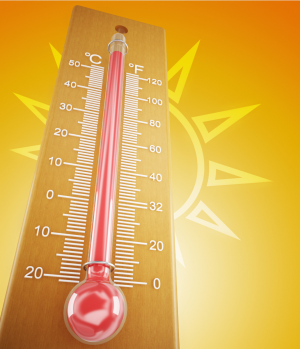Excessive Heat Continues, City Encourages Safety Practices
 An Excessive Heat Warning for Central Texas has been extended through Wednesday evening. Temperatures will remain high all throughout next week. The City of Dripping Springs encourages citizens to continue practicing heat awareness and safety tips. The National Weather Service expects high temperatures from 100-112 degrees and heat index values could reach 118 degrees.
An Excessive Heat Warning for Central Texas has been extended through Wednesday evening. Temperatures will remain high all throughout next week. The City of Dripping Springs encourages citizens to continue practicing heat awareness and safety tips. The National Weather Service expects high temperatures from 100-112 degrees and heat index values could reach 118 degrees.
Recognize Heat-Related Illnesses
Knowing how to identify the symptoms of heat-related illnesses like heat exhaustion and heat stroke can save lives. Protect yourself and those around you by knowing the proper actions to take ifsomeone is experiencing one of these illnesses.
Heat stroke is a serious health risk and can cause permanent damage or death if emergency treatment is not given promptly. If you or someone you know is experiencing heat stroke, MOVE THEM, COOL THEM, CALL 911.
Heat stroke symptoms include:
- Lethargy or loss of consciousness
- Confusion
- Hot, red, dry or damp skin
- Rapid and strong pulse
- Body temperature above 103 F (or if skin is hot to the touch)
Heat exhaustion can progress into heat stroke within minutes if untreated. Move to a cooler and/or shaded area as quickly as possible, loosen the victim’s clothing and have them sip cool water slowly.
Heat exhaustion symptoms include:
- Cool, pale, clammy skin
- Weakness
- Dizziness
- Heavy sweating
- Nausea or vomiting
- Fast, weak pulse
Heat cramps, while the least threatening of heat-related illnesses, can still progress into heat exhaustion and heat stroke if untreated. If you begin experiencing muscle or abdominal cramps in the heat, stop your physical activity, move to a cooler location, drink water and wait for the cramps to go away before doing any more physical activity.
If the cramps last longer than an hour, or the person exhibits signs of heat exhaustion or heat stroke, call 911.
Other precautions to take:
Stay Hydrated: Drinking water throughout the day can prevent a heat-related illness. Avoid sugary or alcoholic beverages in the heat. If you are outdoors for a prolonged period or are participating in a high-energy activity or work, consider drinking an electrolyte containing beverage in addition to taking regular water breaks. Drink water regularly, even if you are not thirsty to avoid becoming dehydrated.
If your pet is outdoors with you, bring plenty of drinking water for them as well as a collapsible bowl to keep your furry friend hydrated.
Keep Your Home Cool: Home owners and renters can protect their homes by taking precautions to keep the temperature down inside their home. Keep curtains drawn and blinds closed to reduce the amount of sunlight entering your home. Running ceiling fans or electric fans can move air through the home, making it feel cooler as well. Stay in an air-conditioned place as much as possible. If your home does not have air conditioning, go to the shopping mall or public library—even a few hours spent in air conditioning can help your body stay cooler when you go back into the heat. Call your local health department to see if there are any heat-relief shelters in your area.
- Keep in mind: Electric fans may provide comfort, but when the temperature is in the high 90s, they will not prevent heat-related illness. Taking a cool shower or bath or moving to an air-conditioned place is a much better way to cool off. Use your stove and oven less to maintain a cooler temperature in your home.
Wear Appropriate Clothing: Choose lightweight, loose-fitting clothing.
Schedule Outdoor Activities Carefully: Try to limit your outdoor activity to when it’s coolest, like morning and evening hours. Rest often in shady areas so that your body has a chance to recover.
Pace Yourself: Cut down on exercise during the heat. If you’re not accustomed to working or exercising in a hot environment, start slowly and pick up the pace gradually. If exertion in the heat makes your heart pound and leaves you gasping for breath, STOP all activity. Get into a cool area or into the shade, and rest, especially if you become lightheaded, confused, weak, or faint.
Wear Sunscreen: Sunburn affects your body’s ability to cool down and can make you dehydrated. If you must go outdoors, protect yourself from the sun by wearing a wide-brimmed hat, sunglasses, and by putting on sunscreen of SPF 15 or higher 30 minutes prior to going out. Continue to reapply it according to the package directions.
Tip: Look for sunscreens that say “broad spectrum” or “UVA/UVB protection” on their labels- these products work best.
Do Not Leave Children in Cars: Cars can quickly heat up to dangerous temperatures, even with a window cracked open. While anyone left in a parked car is at risk, children are especially at risk of getting a heat stroke or dying. When traveling with children, remember to do the following:
Never leave infants, children or pets in a parked car, even if the windows are cracked open.
To remind yourself that a child is in the car, keep a stuffed animal in the car seat. When the child is buckled in, place the stuffed animal in the front with the driver.
When leaving your car, check to be sure everyone is out of the car. Do not overlook any children who have fallen asleep in the car.
Avoid Hot and Heavy Meals: They add heat to your body!
